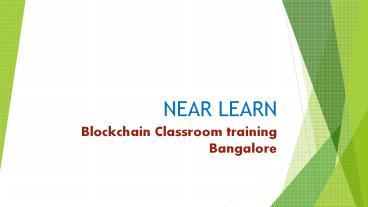blockchain training Bangalore - PowerPoint PPT Presentation
Title:
blockchain training Bangalore
Description:
Blockchain is best known for being the technology behind cryptocurrencies like Bitcoin and Ether (the currency of Ethereum), but blockchain is much more than an instrument of finance. ... Blockchain serves as a bookkeeping platform or ledger that is incorruptible, enforces transparency, and bypasses censorship.Near learn helps in providing Blockchain Certification Training Bangalore visit : – PowerPoint PPT presentation
Number of Views:17
Title: blockchain training Bangalore
1
NEAR LEARN
- Blockchain Classroom training Bangalore
2
What is Blockchain
A technology that
permits transactions to be gathered into blocks
and recorded
cryptographically chains blocks in chronological
order and
allows the resulting ledger to be accessed by
different servers.
3
WHAT IS A DISTRIBUTED LEDGER?
- Centralized Ledger
Distributed Ledger
There are multiple ledgers, but Bank holds the
golden record Client B must reconcile its
own ledger against that of Bank, and must
convince Bank of the true state of the Bank
ledger if discrepancies arise
- There is one ledger. All Nodes have some level of
access to that ledger. - All Nodes agree to a protocol that determines the
true state of the ledger at any point in time.
The application of this protocol is sometimes
called achieving consensus.
4
Whats that got to do with blockchain?
- We have some distributed system
- We need to all agree on the state of some
system - We all agree on the initial state of the
system - A blockchain contains a history of individual
transactions - Thus We can all agree on the current state of
the system - A blockchain lets mutually-distrusting entities
agree on history... ...which lets them agree on
the state of the system now.
5
What problem does a blockchain solve?
- A blockchain lets us agree on the state of the
system, even if we dont all trust each other! - Ultimate goal We all need to agree on the
state of some system. - How much BTC in each account?
- Who owns which property?
- Whats the current state of my program?
- We can all agree on that if we agree on
history. - Starting state history ? current state
- We dont want a single trusted arbiter of the
state of the world. - We want some level of decentralizationnot a
single point of failure or compromise.
6
How does it work?
- A blockchain is a sequence of hash-chained
records - Once youve seen record N, you cant change
anything in the past. - Some procedure for adding blocks to blockchain
- Who gets to add blocks? How is it done?
- Validity conditions for new blocks
- Are transactions valid? Are digital signatures
correct? Etc. - Enforced by consensus-chains with invalid
blocks wont be accepted. - Some procedure for deciding between
alternative candidate blockchains. - When Alice and Bob have different pictures of
history, theres some way for them to eventually
come to agreement about who is right.
7
For more detailsvisit www.nearlearn.com































